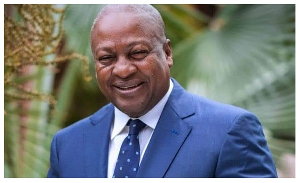In a world where nations are investing in artificial intelligence, space exploration, and advanced education systems, it is deeply worrying that former President John Dramani Mahama seems fixated on livestock—guinea fowls, chickens, and goats—when discussing his plans for Ghana’s economy.
Each time he talks about these animals in the context of national development, I feel an overwhelming sense of disbelief. It’s as though Mahama is stuck in the past, unable to articulate a vision that matches the demands of the 21st century or he actually is.
Mahama’s supposed “24-hour economy” has become the cornerstone of his economic messaging, but the details of this plan leave much to be desired. He proposes ideas like building airports in every region as part of this 24-hour economy concept. While regional development is critical, building airports everywhere without a clear plan for how they’ll be funded, used, or sustained shows a lack
of strategic thinking. Infrastructure projects like this need careful planning, not just promises aimed at gaining political points.
Instead of driving Ghana forward, these poorly conceived ideas seem more like distractions from the real challenges we face. Another part of Mahama’s 24-hour economy as explained by him and his associates includes the bizarre idea of selling waakye (a popular local dish) for 24 hours. While the notion of supporting small businesses and encouraging entrepreneurship is commendable, presenting it as a cornerstone of national economic policy is misguided.
It trivializes the deeper structural reforms needed to stimulate economic growth, create jobs, and improve livelihoods. Selling waakye at all hours won’t
fix our struggling education system, won’t attract foreign investment, and certainly won’t position Ghana as a leader in the global economy.
But perhaps the most baffling part of his vision is his suggestion to rear lions for 24 hours. While livestock farming can indeed be part of an agricultural policy, focusing on lions or using them as a symbol of economic empowerment is a strange and ineffective way to frame Ghana’s future.
Mahama seems to miss the point: the real solutions for Ghana do not lie in rearing exotic animals or selling street food at odd hours. These ideas are distractions, not strategies. Contrast this with Dr. Mahamudu Bawumia’s leadership, which is focused on real, transformative policies that will propel Ghana into the future. Dr. Bawumia understands that modern economies
are driven by technology, innovation, and digitalization. One of his flagship initiatives, the Mobile Money Interoperability System, has revolutionized financial transactions in Ghana, providing millions of Ghanaians with access to formal banking services and improving financial inclusion.
This system allows Ghanaians to transfer money seamlessly across different networks, bridging the financial gap between urban and rural areas. In addition, the Ghana Card has been a transformative tool for governance and service delivery. This digital identity system integrates various government databases, enabling citizens to access public services, pay taxes, and conduct business more efficiently. It’s a bold move that positions Ghana as a leader in digital governance, helping streamline bureaucracy and reduce corruption.
Dr. Bawumia has also been at the forefront of promoting a cashless economy, another bold solution that will modernize Ghana’s financial systems. By reducing reliance on physical cash, the country can improve transparency, cut down on corruption, and make financial transactions easier and faster. These are the kinds of forward-thinking policies that position Ghana for long-term growth.
Even the introduction of paperless ports under Bawumia’s leadership has had a profound impact. By digitalizing the port and customs processes, he has made import and export operations more efficient, reducing delays and cutting costs for businesses. This move enhances Ghana’s ability to compete in the global economy by facilitating trade and improving the ease of doing business.
Where Bawumia offers bold, practical solutions, Mahama’s ideas seem more like populist gimmicks. A 24-hour economy built on waakye stands, livestock, and scattered airports will not bring the transformative change Ghana needs. We live in a time where innovation, digital transformation, and strategic economic policies are key to building a prosperous future. It’s time to reject the backward-looking ideas of chickens, goats, and guinea fowls and embrace the future that leaders like Dr. Bawumia envision for Ghana.
Ghana deserves leadership that is not only in touch with the aspirations of its people but also in tune with global trends. It’s time to leave behind the trivial debates and focus on the real solutions that will lift our nation to new heights.
Opinions of Wednesday, 18 September 2024
Columnist: Kwaku Bimpeh



















